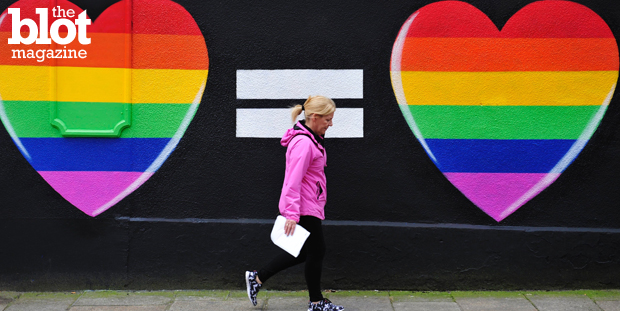
While the land of the free and the home of the brave still dithers over whether same-sex couples are, in fact, equal citizens with the right to wed, the Republic of Ireland has decided in a popular referendum to amend its constitution to acknowledge that very right. The idea that Ireland, of all places, is more socially progressive than America is mind-boggling to me.
The vote on Friday, May 22, was on a simple yes or no question. Should the Irish constitution be amended by adding this section to it: “Marriage may be contracted in accordance with law by two persons without distinction as to their sex?” On a turnout of 60.5 percent, 1,201, 607 (62.1 percent) voted yes, and 734,300 (37.9 percent) voted no. All Irish citizens resident in Ireland and at least 18 years old were eligible to vote. Of the Republic’s 43 constituencies, only Roscommon-South Leitrim voted no (even there, 48.6 percent voted for the amendment). Next, the legislature (the Dail) must pass a law implementing the amendment, and gay marriages will likely be possible by autumn.
If you know anything about Ireland’s history and politics, you can only shake your head in wonder at the radical change that this represents. The 1937 constitution, written by then-Prime Minister Eamon De Valera in consultation with Catholic Church leaders, reflects the interests of the Church of Rome. The institutions of the state are instructed to “to guard with special care the institution of marriage, on which the family is founded, and to protect it against attack.”
Read more: First Comes Love, Then Comes Gay Marriage … Then What?
In principle, that may seem rather innocuous. In practice, it formed the basis of a rather repressive political culture. Lest this sound like an atheist (and great-grandson of an Orange Lodge member) attacking the Church gratuitously, let one of Ireland’s more popular priests explain. “Ireland is a prime example of what the church is facing, because they made this island into a concentration camp where they could control everything,” Mark Patrick Hederman, abbot of Glenstal Abbey, a Benedictine monastery in County Limerick, told The New York Times Magazine in 2011. “And the control was really all about sex. They told you if you masturbated, it meant you were impure and had allowed the devil to work on you. Generations of people were crucified with guilt complexes. Now the game is up.”
Homosexuality in Ireland was not only frowned upon: Until 1993, it was illegal. You could actually go to jail for having sex with a member of the same sex. In 2010, however, civil unions became the law of the land, and really, the stage was set for the referendum. In addition, there were heavy sanctions against divorce and contraception. Divorce was banned by the 1937 constitution. In 1986, there was a referendum to loosen the rules up, and it was defeated 63.5 percent against with just 36.5 percent for. In 1995, a second divorce referendum passed by a whisker: 50.28 percent for and 48.72 percent against.
As for contraception, it was never illegal to possess or use contraceptive devices or drugs. However, it was against the law to sell or import them. So, you had women in the Irish Republic driving up to Northern Ireland (part of the United Kingdom), buying what they needed, and then, they would smuggle it back home. In 1978, this was liberalized, but a woman needed a prescription for contraceptives. Condoms and spermicides were made available without a prescription to those over 18 in 1985. In 1992, the law got tweaked a little, and an amendment in 1993 to the whole thing is the last bit of law passed. It’s still not as easy to buy a contraceptive in Ireland as it is in most other European nations.
Read more: Forget Colorado: Ireland Accidentally Legalizes Meth, Ecstasy and ‘Shrooms
To those Americans under the age of 30, this may all seem like ancient history. But all of this happened since I was a senior in high school. Ireland has become a much more liberal society, and it took just one generation. Sociologists will debate the reasons, but I suspect becoming a richer nation and part of the European Union had a lot to do with it. When people travel, they get a fresh perspective on life. The recent unpleasantness involving sexual abuse by members of the Catholic Church has also played a significant role I would think.
Dublin may not be as libertine as Amsterdam or Las Vegas, but gay marriages are now recognized in that city and not in Dallas, Atlanta or Cleveland. Chew on that for a while.
There is one last Irishman from whom we need desperately to hear. Justice Anthony Kennedy is reckoned to be the swing vote on the U.S. Supreme Court in lifting the prohibitions that remain in America on marriage equality.
“Love is never defeated, and I could add, the history of Ireland proves it.” — Pope John Paul II from a speech to the people of Galway, Ireland, in September 1979.
Jeff Myhre is a contributing journalist for TheBlot Magazine.






One Comment
Leave a Reply